新概念英语第二册Lesson 79 By air课件(共63张PPT)
文档属性
| 名称 | 新概念英语第二册Lesson 79 By air课件(共63张PPT) | 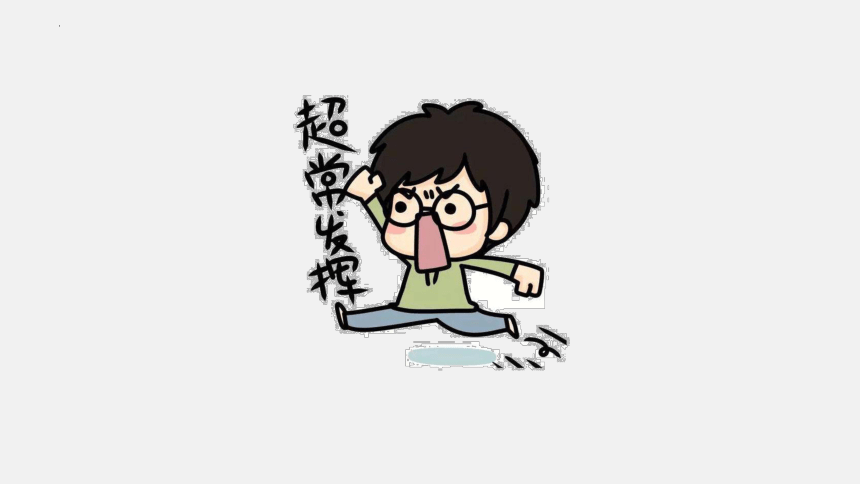 | |
| 格式 | pptx | ||
| 文件大小 | 3.5MB | ||
| 资源类型 | 教案 | ||
| 版本资源 | 新概念英语 | ||
| 科目 | 英语 | ||
| 更新时间 | 2024-02-19 19:11:21 | ||
图片预览

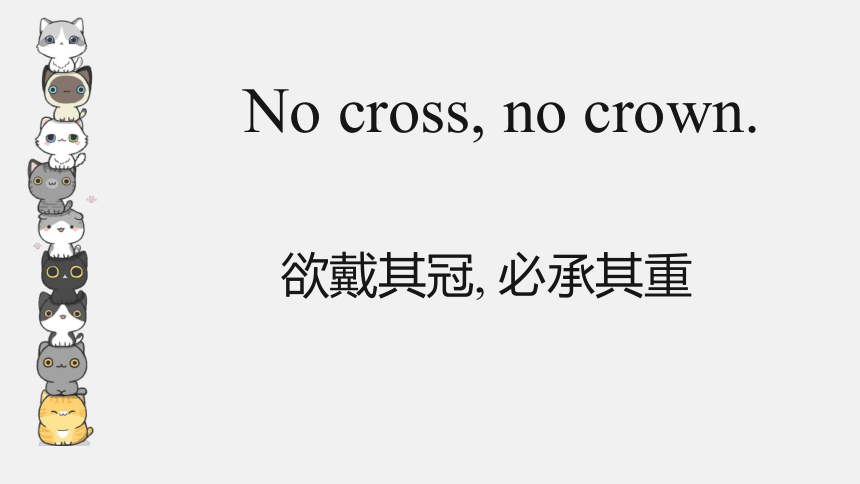
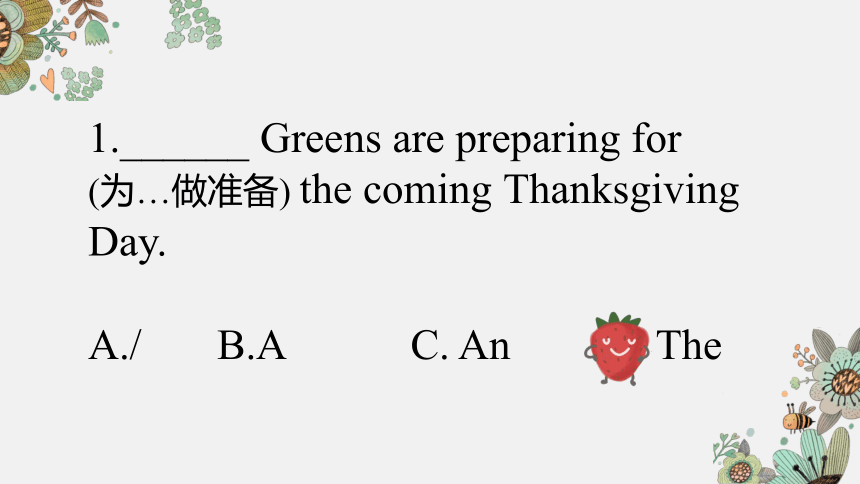
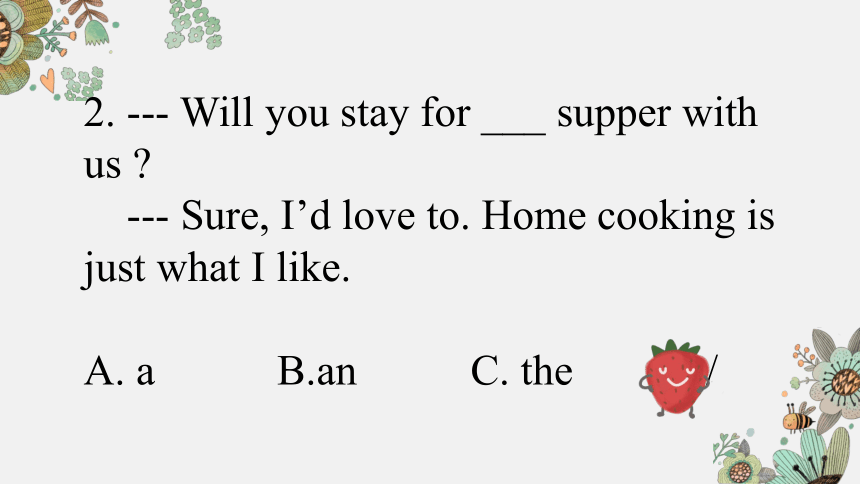
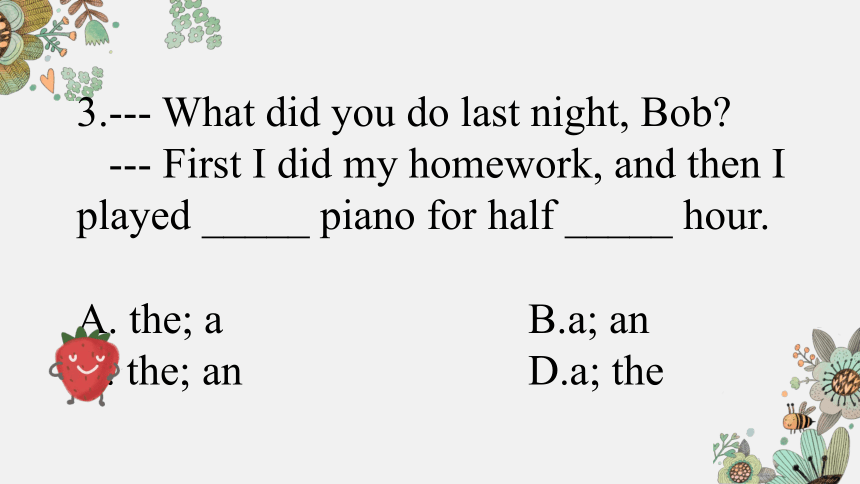
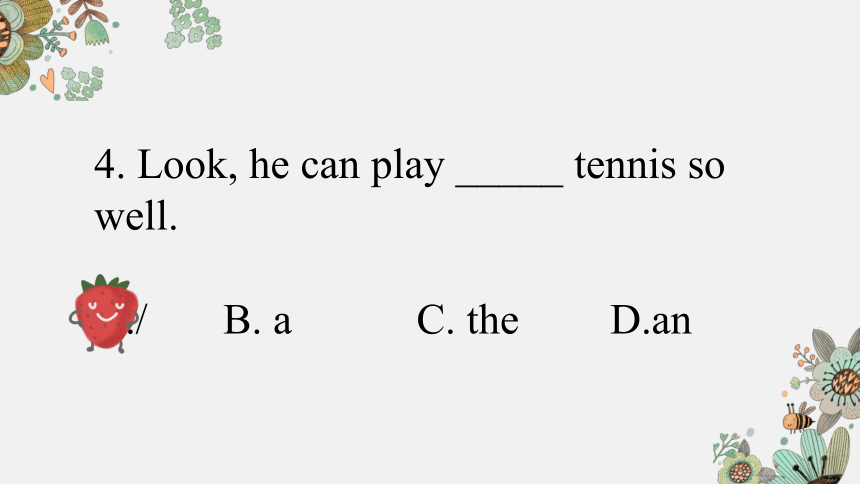
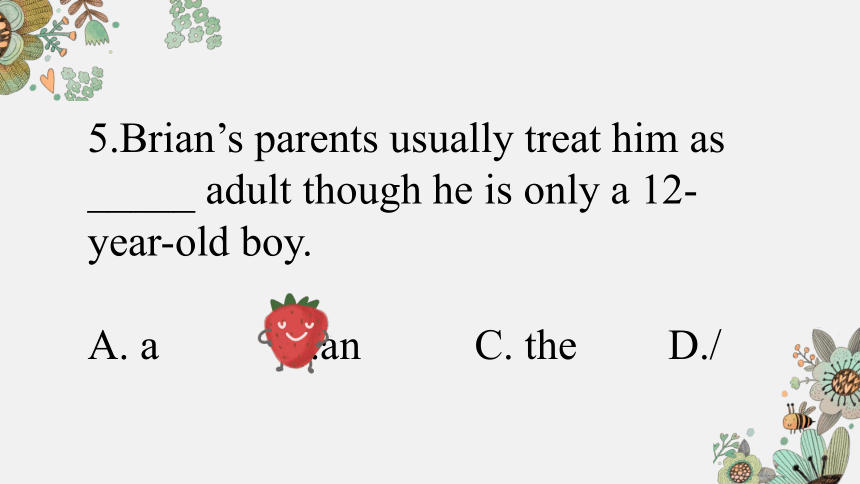
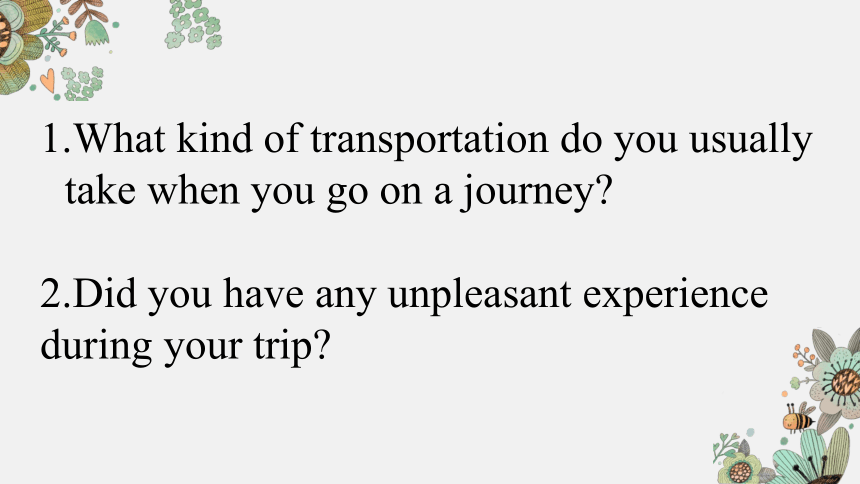
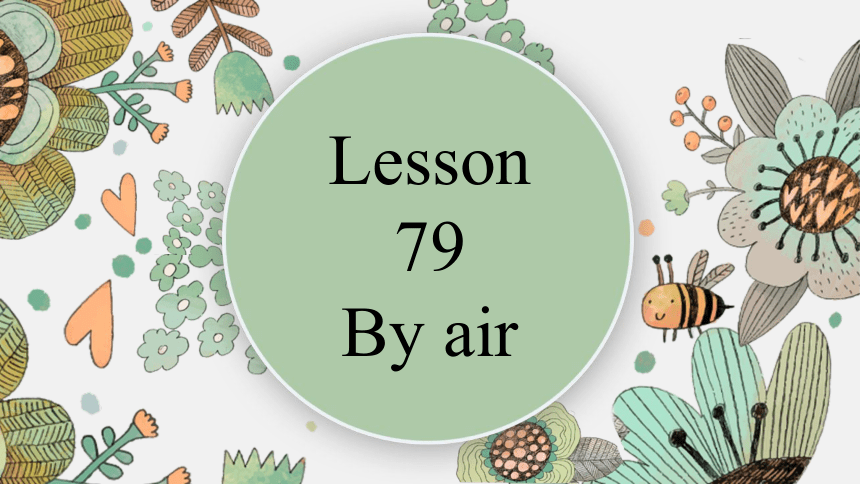
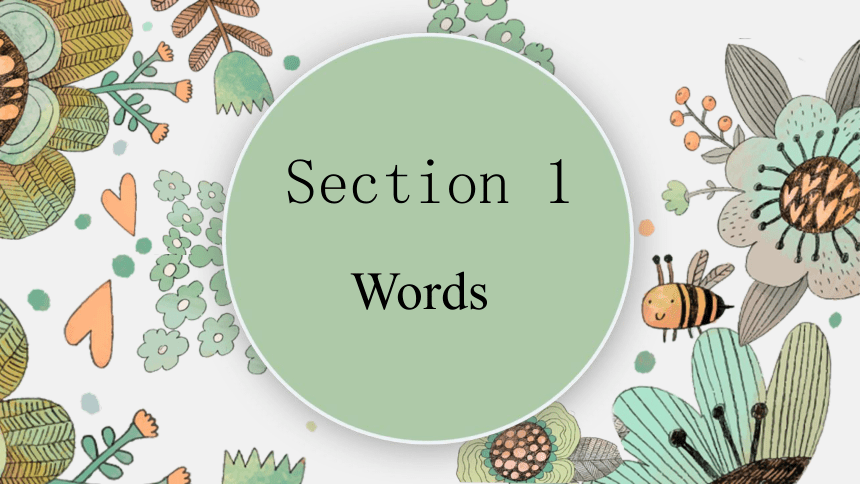
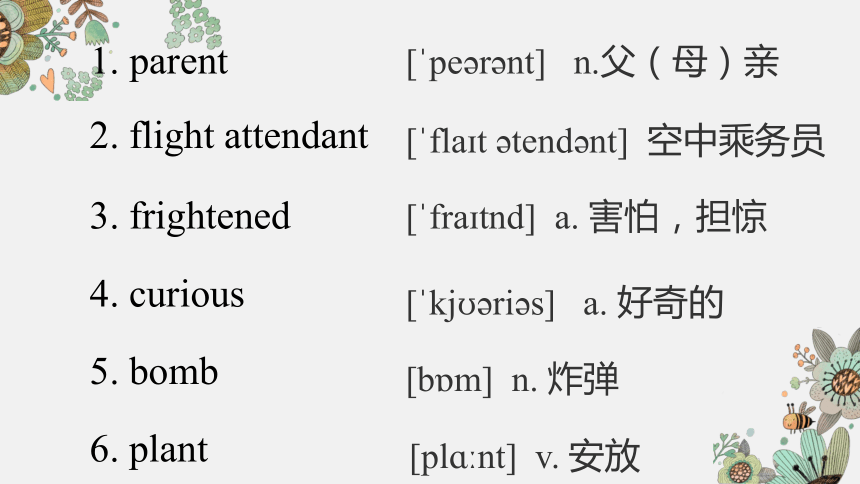
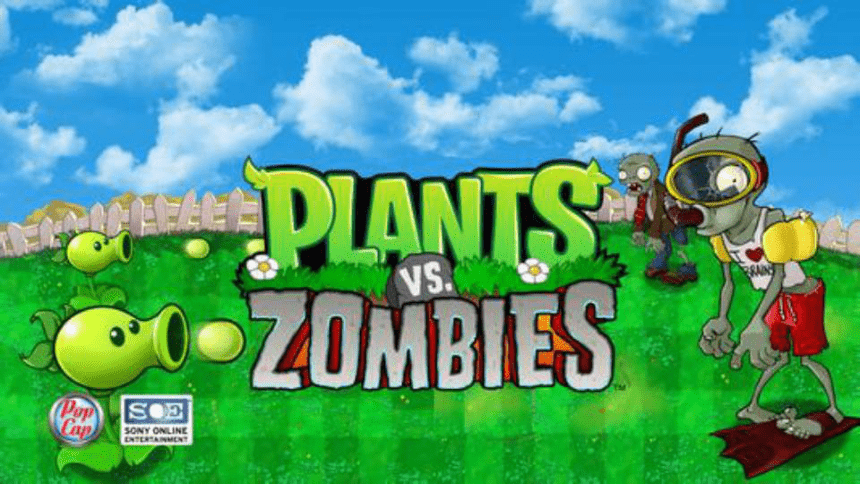
文档简介
(共63张PPT)
欲戴其冠, 必承其重
No cross, no crown.
1.______ Greens are preparing for (为…做准备) the coming Thanksgiving Day.
A./ B.A C. An D. The
2. --- Will you stay for ___ supper with us
--- Sure, I’d love to. Home cooking is just what I like.
A. a B.an C. the D./
3.--- What did you do last night, Bob
--- First I did my homework, and then I played _____ piano for half _____ hour.
A. the; a B.a; an
C. the; an D.a; the
4. Look, he can play _____ tennis so well.
A./ B. a C. the D.an
5.Brian’s parents usually treat him as _____ adult though he is only a 12-year-old boy.
A. a B.an C. the D./
What kind of transportation do you usually take when you go on a journey
2.Did you have any unpleasant experience during your trip
Lesson 79
By air
Section 1
Words
[ pe r nt] n.父(母)亲
[ fla t tend nt] 空中乘务员
[ fra tnd] a. 害怕,担惊
[ kj ri s] a. 好奇的
[b m] n. 炸弹
[plɑ nt] v. 安放
1. parent
2. flight attendant
3. frightened
4. curious
5. bomb
6. plant
bomb
unpleasant
frightened
parent
gain
flight
curious
plant
attendant
Section 2
Text
The writer seldom travel by air when he was a boy.
2. A flight attendant would take charge of the writer.
3. The writer has never felt frightened travelling by air.
4. A flight attendant told the passengers to keep calm and stay on the plane.
5. A bomb was found on the plane in the end.
T
F
F
F
F
1. I used to travel by air a great deal when I was a boy. My parents used to live in South America and I used to fly there from Europe in the holidays.
used to do sth.
过去常常做某事
1. He used to smoke 40 cigarettes a day.
2. I used to hitchhike very often.
3. He used to eat a lot of sweets.
5. Did he use to eat a lot of sweets
4. He didn’t use to eat a lot of sweets.
1.Liz ____________ a motorbike, but last year she sold it and bought a car.
2.We came to live in Shanghai few months ago. We ____________ in Shenzhen.
3.Jim ___________ in the evening, but recently he keeps going out.
used to have
used to live
used to stay
4.My grandmother was very economical(节俭的) and she ____________ spend a lot of money.
5.When you lived in London, ______________ to the theatre very often
didn’t use to
did you use to go
2. A flight attendant would take charge of me and I never had an unpleasant experience.
attend
+sb. 照顾
A nurse attends my grandmother.
He was attended by several doctors.
flight attendant
空乘
take charge of sb.
负责
1.这个司机要为这场事故负责。
2.我负责给这个木乃伊做手术。
The driver takes charge of the accident.
I take charge of having an operation on the mummy.
Daddy would wake me up for breakfast about 7:30. Then we would head outside to go for a drive. Daddy would get into the car and turn the ignition key. Inevitably, nothing would happen. He would push and pull every button on the dashboard, but the motor wouldn’t start. At length he would sigh and say to me, “ Honey, the car just won’t start until you give me a kiss.”
When he was there, he ______ go to that coffee shop at the corner after work every day.(全国卷)
A. would B. should
C. need D. might
2. When I lived with my roommates in the university, we _____ often talk into the night.(西城一模)
A. might B. must
C. should D. would
3. I am used to travelling by air and only on one occasion have I ever felt frightened.
be/ get used to sth.
习惯于…
1. We are/ get used to the food here.
2. We are/ get used to driving on the right.
I wouldn’t like to share an office. I’m used to ________(have) my own office.
2.When we were children, we used to ______(go) swimming every day.
having
go
3.We used to ________(live) in a small village but now we live in London.
4.I feel very full after that meal. I’m not used to _______(eat) so much.
live
eating
4.After taking off, we were flying low over the city and slowly gaining height, when the plane suddenly turned round and flew back to the airport.
gain
height
knowledge
reputation
experience
高度
知识
名声
经验
get sth. little by little
turn round
turn away
转身
扭头
5. While we were waiting to land, a flight attendant told us to keep calm and to get off the plane quietly as soon as it had touched down.
touch down
着陆
take off
起飞
6. Everybody on board was worried and we were curious to find out what had happened.
curious (a) 好奇的
be curious about
我对这架直升飞机很好奇。
对…感到好奇的
I am curious about this helicopter.
7. Later we learnt that there was a very important person on board. The police had been told that a bomb had been planted on the plane.
board games
boarding school
boarding card
be on board
寄宿学校
登机牌
在船上,在飞机上
棋类游戏
bomb (n) 炸弹
安放炸弹
我们在桥底下安放了炸弹。
炸弹爆炸
The bomb went off at 9:30 in the morning.
plant a bomb
We planted a bomb under the bridge.
8. After we had landed, the plane was searched thoroughly. Fortunately, nothing was found and five hours later we were able to take off again.
thorough
adj. 彻底的
2. You should examine your car thoroughly.
1. a thorough cleaning
thoroughly
adv. 彻底地
1.过去常常做某事
2. 大量的
3.空乘
4.照顾某人
5.习惯于做某事
used to do sth.
a great deal (of)
flight attendant
attend sb.
be/get used to doing sth.
6.增加高度
7.转身
8.扭头
9.起飞
10.着陆
gain height
turn round
turn back
take off
touch down
11.对…好奇的
12.在飞机上
13.安放炸弹
14.负责
15.发现,找出
be curious about
on board
plant the bomb
take charge of
find out
1.__________ a. feeling afraid or worried
2.__________ a. interested in learning about people or things around you.
3.__________ n. a weapon that explodes and is used to kill or hurt people or to damage buildings
frightened
curious
bomb
4.__________ phr. to get information about something because you want to know more about it
5.__________ phr. (plane) to land
6.__________ v. to put something firmly and strongly in a particular place
plant
find out
touch down
1.Dr. Smith is assigned to ____________the department. (看管)
2.It is good to _________________the word around you.(对…好奇的)
3.My plane would _____________just long enough to let me off. (着陆)
take charge of
be curious about
touch down
4.The accident happened as the jet was about to _________.(起飞)
5.They told me to stand still and not to _______________.(转身)
6.She made it her business to _________who was responsible.(找出)
take off
turn round
find out
7.Your friendship means _____________to me.(很多)
8.The word was finally given for us to get ______________.(登船)
9.The programme affords young people the chance to _______ work experience. (获得)
a great deal
on board
gain
1.我在幼年的时候,曾多次乘飞机旅行。
2.我习惯了乘飞机旅行,只是有一次把我吓坏了。
I used to travel by air a great deal when I was a boy.
I am used to travelling by air and only on one occasion have I ever felt frightened.
3.在我们等待降落时, 一位空中乘务员告诉我们要保持镇静,待飞机一着陆,就安静地离开飞机。
While we were waiting to land, a flight attendant told us to keep calm and to get off the plane quietly as soon as it had touched down.
4. 有人报告警察,说飞机上安放了一枚炸弹。
5.我总是由一位空中乘务员照管,从未遇到过不愉快的经历。
The police had been told that a bomb had been planted on the plane.
A flight attendant would take care of me and I never had an unpleasant experience.
Section 3
Grammar
一般过去时总复习
一般过去时
定义
时间标志词
与现完的区别
动词变化
定义
1. I caught a bad cold 3 days ago.
2. Lily was seriously ill yesterday because of the cold weather.
3. The People’s Republic of China was founded in 1949.
过去某个时间点发生的动作或某种状态
动词过去式变化
规则变化
(1)直接+ ed
(2)去e+ ed
(3)双写辅音字母+ ed(重读闭音节)
(4)变y为i + ed(辅y)
insist, erupt, avoid
examine, escape, manage,
bury, cry, try
regret, prefer, trap
不规则变化
1)AAA
2)ABB
3)ABC
4)ABA
shut-________-_______
spread-______-_______
smell-_______-_______
hold-_______-________
fly-_________-________
fall-________-_________
come-______-______
run-_____-_____
shut
shut
spread
spread
smelt
smelt
held
held
flew
flown
fell
fallen
came
come
ran
run
beat
beaten
beat
show
shown
showed
与现完的区别
1. Lucy caught a bad cold last week.
2. She has been ill for 3 days!
区别:
(1)过去的动作或状态是否已结束
(2)过去的动作是否对现在产生影响
与现完的区别
1. I_______ my hands.
A. cleaned B. have cleaned
2. I _______ my hands so they are clean.
A. cleaned B. have cleaned
1.Oh, no! I _____ the book in the lab.
A. leave B. left
C. will leave D. was leaving
2. Last night his house _____ after a heavy rain.
A. falls down B. fell down
C. felt down D. fall down
3. --- Your name again, please I ___ quite catch you.
--- Carry Smith.
A. won’t B. don’t
C. wouldn’t D. didn’t
4. --- Excuse me, sir. This is a non-smoking room.
--- Oh, sorry. I ____ the sign.
A. don’t see B. didn’t see
C. won’t see D. wasn’t see
5. --- Wow! What a nice bike! Is it yours
--- No, it isn’t. I ____ it from a friend of mine.
A. borrow B. am borrowing
C. will borrow D. borrowed
6. ---Sorry, Tom. I can’t find the book you _______ me.
--- It’s OK. I don’t need it anymore.
A. lend B. have lent
C. will lent D. lent
7. --- Is Rick there
--- No, he _____ for Beijing three days ago.
A. left B. leaves
C. leaving D. leave
8. --- ____ you ____ your homework yet
--- Yes, I ____ it ten minutes ago.
A. Did; do; finished
B. Have; done; finished
C. Will; do; finish
D. Have; done; have finished
9. The debate on whether to keep pets ____ forty minutes yesterday afternoon.
A. last B. lasted
C. will last D. has lasted
Thanks
欲戴其冠, 必承其重
No cross, no crown.
1.______ Greens are preparing for (为…做准备) the coming Thanksgiving Day.
A./ B.A C. An D. The
2. --- Will you stay for ___ supper with us
--- Sure, I’d love to. Home cooking is just what I like.
A. a B.an C. the D./
3.--- What did you do last night, Bob
--- First I did my homework, and then I played _____ piano for half _____ hour.
A. the; a B.a; an
C. the; an D.a; the
4. Look, he can play _____ tennis so well.
A./ B. a C. the D.an
5.Brian’s parents usually treat him as _____ adult though he is only a 12-year-old boy.
A. a B.an C. the D./
What kind of transportation do you usually take when you go on a journey
2.Did you have any unpleasant experience during your trip
Lesson 79
By air
Section 1
Words
[ pe r nt] n.父(母)亲
[ fla t tend nt] 空中乘务员
[ fra tnd] a. 害怕,担惊
[ kj ri s] a. 好奇的
[b m] n. 炸弹
[plɑ nt] v. 安放
1. parent
2. flight attendant
3. frightened
4. curious
5. bomb
6. plant
bomb
unpleasant
frightened
parent
gain
flight
curious
plant
attendant
Section 2
Text
The writer seldom travel by air when he was a boy.
2. A flight attendant would take charge of the writer.
3. The writer has never felt frightened travelling by air.
4. A flight attendant told the passengers to keep calm and stay on the plane.
5. A bomb was found on the plane in the end.
T
F
F
F
F
1. I used to travel by air a great deal when I was a boy. My parents used to live in South America and I used to fly there from Europe in the holidays.
used to do sth.
过去常常做某事
1. He used to smoke 40 cigarettes a day.
2. I used to hitchhike very often.
3. He used to eat a lot of sweets.
5. Did he use to eat a lot of sweets
4. He didn’t use to eat a lot of sweets.
1.Liz ____________ a motorbike, but last year she sold it and bought a car.
2.We came to live in Shanghai few months ago. We ____________ in Shenzhen.
3.Jim ___________ in the evening, but recently he keeps going out.
used to have
used to live
used to stay
4.My grandmother was very economical(节俭的) and she ____________ spend a lot of money.
5.When you lived in London, ______________ to the theatre very often
didn’t use to
did you use to go
2. A flight attendant would take charge of me and I never had an unpleasant experience.
attend
+sb. 照顾
A nurse attends my grandmother.
He was attended by several doctors.
flight attendant
空乘
take charge of sb.
负责
1.这个司机要为这场事故负责。
2.我负责给这个木乃伊做手术。
The driver takes charge of the accident.
I take charge of having an operation on the mummy.
Daddy would wake me up for breakfast about 7:30. Then we would head outside to go for a drive. Daddy would get into the car and turn the ignition key. Inevitably, nothing would happen. He would push and pull every button on the dashboard, but the motor wouldn’t start. At length he would sigh and say to me, “ Honey, the car just won’t start until you give me a kiss.”
When he was there, he ______ go to that coffee shop at the corner after work every day.(全国卷)
A. would B. should
C. need D. might
2. When I lived with my roommates in the university, we _____ often talk into the night.(西城一模)
A. might B. must
C. should D. would
3. I am used to travelling by air and only on one occasion have I ever felt frightened.
be/ get used to sth.
习惯于…
1. We are/ get used to the food here.
2. We are/ get used to driving on the right.
I wouldn’t like to share an office. I’m used to ________(have) my own office.
2.When we were children, we used to ______(go) swimming every day.
having
go
3.We used to ________(live) in a small village but now we live in London.
4.I feel very full after that meal. I’m not used to _______(eat) so much.
live
eating
4.After taking off, we were flying low over the city and slowly gaining height, when the plane suddenly turned round and flew back to the airport.
gain
height
knowledge
reputation
experience
高度
知识
名声
经验
get sth. little by little
turn round
turn away
转身
扭头
5. While we were waiting to land, a flight attendant told us to keep calm and to get off the plane quietly as soon as it had touched down.
touch down
着陆
take off
起飞
6. Everybody on board was worried and we were curious to find out what had happened.
curious (a) 好奇的
be curious about
我对这架直升飞机很好奇。
对…感到好奇的
I am curious about this helicopter.
7. Later we learnt that there was a very important person on board. The police had been told that a bomb had been planted on the plane.
board games
boarding school
boarding card
be on board
寄宿学校
登机牌
在船上,在飞机上
棋类游戏
bomb (n) 炸弹
安放炸弹
我们在桥底下安放了炸弹。
炸弹爆炸
The bomb went off at 9:30 in the morning.
plant a bomb
We planted a bomb under the bridge.
8. After we had landed, the plane was searched thoroughly. Fortunately, nothing was found and five hours later we were able to take off again.
thorough
adj. 彻底的
2. You should examine your car thoroughly.
1. a thorough cleaning
thoroughly
adv. 彻底地
1.过去常常做某事
2. 大量的
3.空乘
4.照顾某人
5.习惯于做某事
used to do sth.
a great deal (of)
flight attendant
attend sb.
be/get used to doing sth.
6.增加高度
7.转身
8.扭头
9.起飞
10.着陆
gain height
turn round
turn back
take off
touch down
11.对…好奇的
12.在飞机上
13.安放炸弹
14.负责
15.发现,找出
be curious about
on board
plant the bomb
take charge of
find out
1.__________ a. feeling afraid or worried
2.__________ a. interested in learning about people or things around you.
3.__________ n. a weapon that explodes and is used to kill or hurt people or to damage buildings
frightened
curious
bomb
4.__________ phr. to get information about something because you want to know more about it
5.__________ phr. (plane) to land
6.__________ v. to put something firmly and strongly in a particular place
plant
find out
touch down
1.Dr. Smith is assigned to ____________the department. (看管)
2.It is good to _________________the word around you.(对…好奇的)
3.My plane would _____________just long enough to let me off. (着陆)
take charge of
be curious about
touch down
4.The accident happened as the jet was about to _________.(起飞)
5.They told me to stand still and not to _______________.(转身)
6.She made it her business to _________who was responsible.(找出)
take off
turn round
find out
7.Your friendship means _____________to me.(很多)
8.The word was finally given for us to get ______________.(登船)
9.The programme affords young people the chance to _______ work experience. (获得)
a great deal
on board
gain
1.我在幼年的时候,曾多次乘飞机旅行。
2.我习惯了乘飞机旅行,只是有一次把我吓坏了。
I used to travel by air a great deal when I was a boy.
I am used to travelling by air and only on one occasion have I ever felt frightened.
3.在我们等待降落时, 一位空中乘务员告诉我们要保持镇静,待飞机一着陆,就安静地离开飞机。
While we were waiting to land, a flight attendant told us to keep calm and to get off the plane quietly as soon as it had touched down.
4. 有人报告警察,说飞机上安放了一枚炸弹。
5.我总是由一位空中乘务员照管,从未遇到过不愉快的经历。
The police had been told that a bomb had been planted on the plane.
A flight attendant would take care of me and I never had an unpleasant experience.
Section 3
Grammar
一般过去时总复习
一般过去时
定义
时间标志词
与现完的区别
动词变化
定义
1. I caught a bad cold 3 days ago.
2. Lily was seriously ill yesterday because of the cold weather.
3. The People’s Republic of China was founded in 1949.
过去某个时间点发生的动作或某种状态
动词过去式变化
规则变化
(1)直接+ ed
(2)去e+ ed
(3)双写辅音字母+ ed(重读闭音节)
(4)变y为i + ed(辅y)
insist, erupt, avoid
examine, escape, manage,
bury, cry, try
regret, prefer, trap
不规则变化
1)AAA
2)ABB
3)ABC
4)ABA
shut-________-_______
spread-______-_______
smell-_______-_______
hold-_______-________
fly-_________-________
fall-________-_________
come-______-______
run-_____-_____
shut
shut
spread
spread
smelt
smelt
held
held
flew
flown
fell
fallen
came
come
ran
run
beat
beaten
beat
show
shown
showed
与现完的区别
1. Lucy caught a bad cold last week.
2. She has been ill for 3 days!
区别:
(1)过去的动作或状态是否已结束
(2)过去的动作是否对现在产生影响
与现完的区别
1. I_______ my hands.
A. cleaned B. have cleaned
2. I _______ my hands so they are clean.
A. cleaned B. have cleaned
1.Oh, no! I _____ the book in the lab.
A. leave B. left
C. will leave D. was leaving
2. Last night his house _____ after a heavy rain.
A. falls down B. fell down
C. felt down D. fall down
3. --- Your name again, please I ___ quite catch you.
--- Carry Smith.
A. won’t B. don’t
C. wouldn’t D. didn’t
4. --- Excuse me, sir. This is a non-smoking room.
--- Oh, sorry. I ____ the sign.
A. don’t see B. didn’t see
C. won’t see D. wasn’t see
5. --- Wow! What a nice bike! Is it yours
--- No, it isn’t. I ____ it from a friend of mine.
A. borrow B. am borrowing
C. will borrow D. borrowed
6. ---Sorry, Tom. I can’t find the book you _______ me.
--- It’s OK. I don’t need it anymore.
A. lend B. have lent
C. will lent D. lent
7. --- Is Rick there
--- No, he _____ for Beijing three days ago.
A. left B. leaves
C. leaving D. leave
8. --- ____ you ____ your homework yet
--- Yes, I ____ it ten minutes ago.
A. Did; do; finished
B. Have; done; finished
C. Will; do; finish
D. Have; done; have finished
9. The debate on whether to keep pets ____ forty minutes yesterday afternoon.
A. last B. lasted
C. will last D. has lasted
Thanks
同课章节目录
